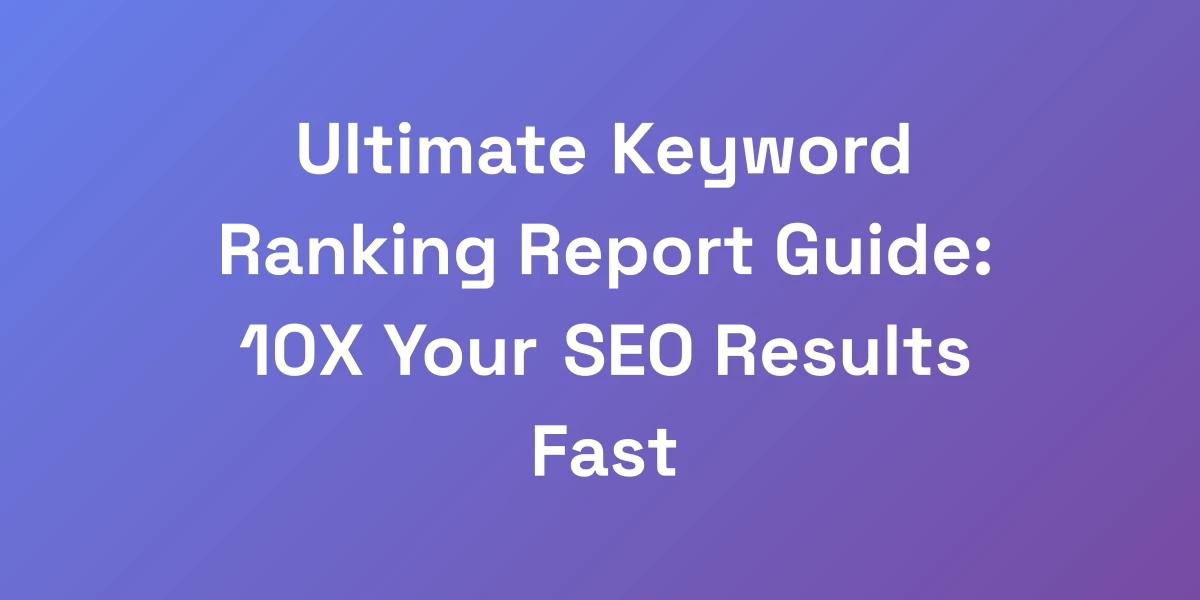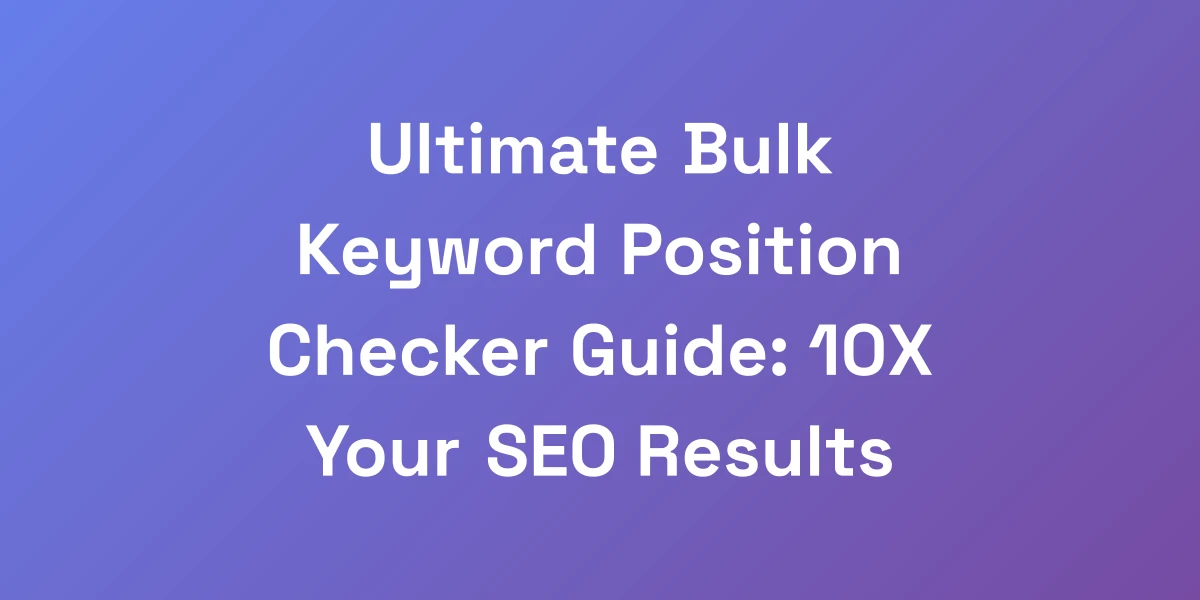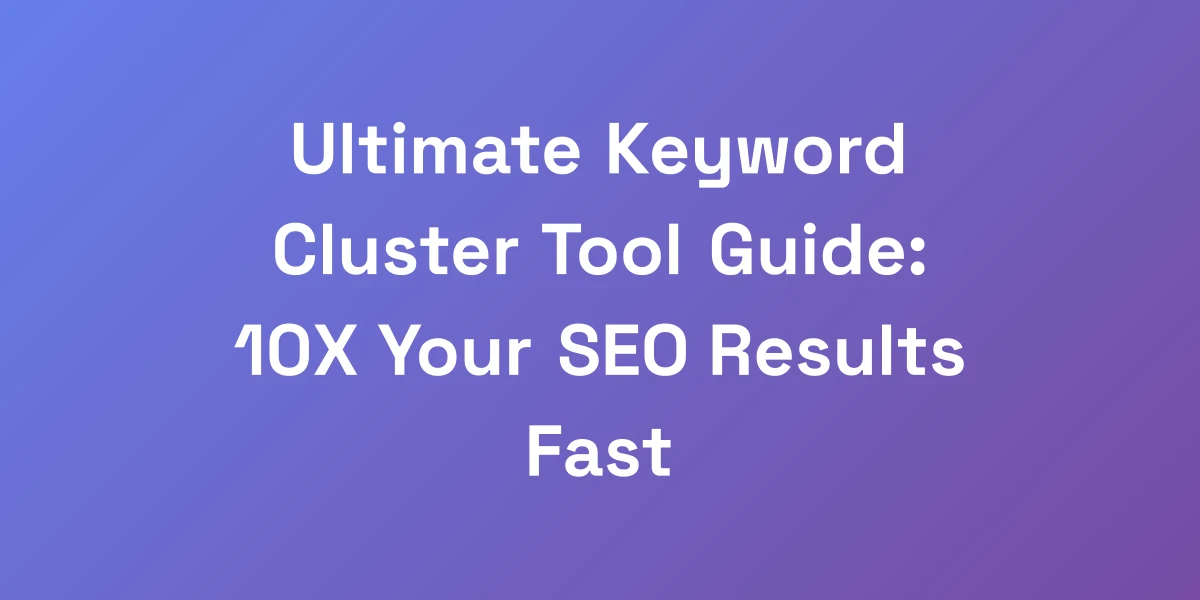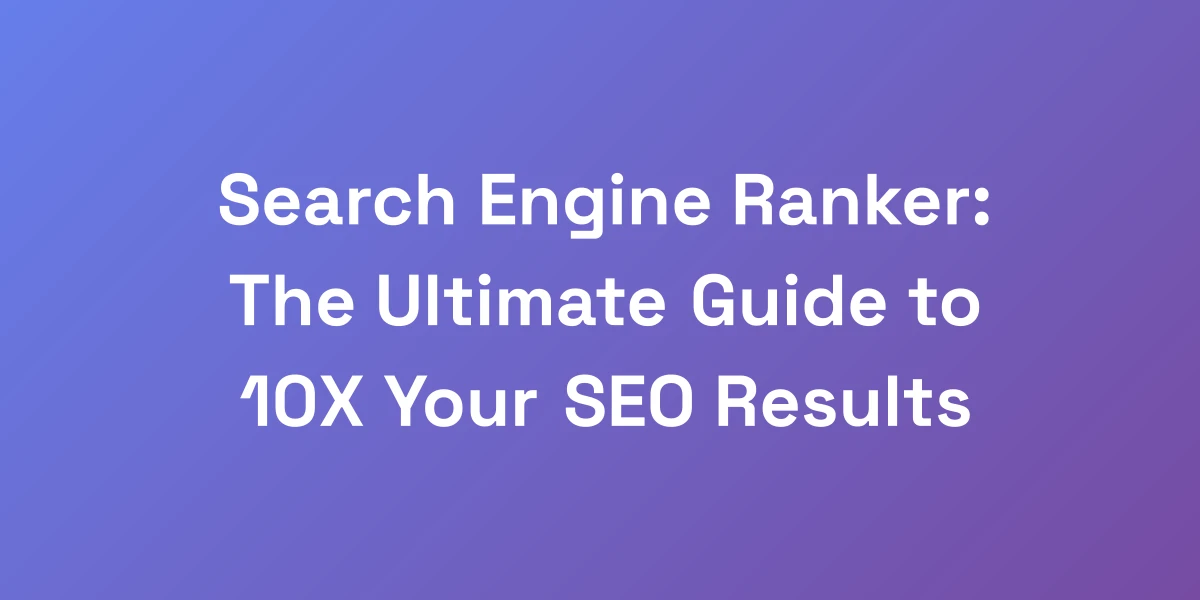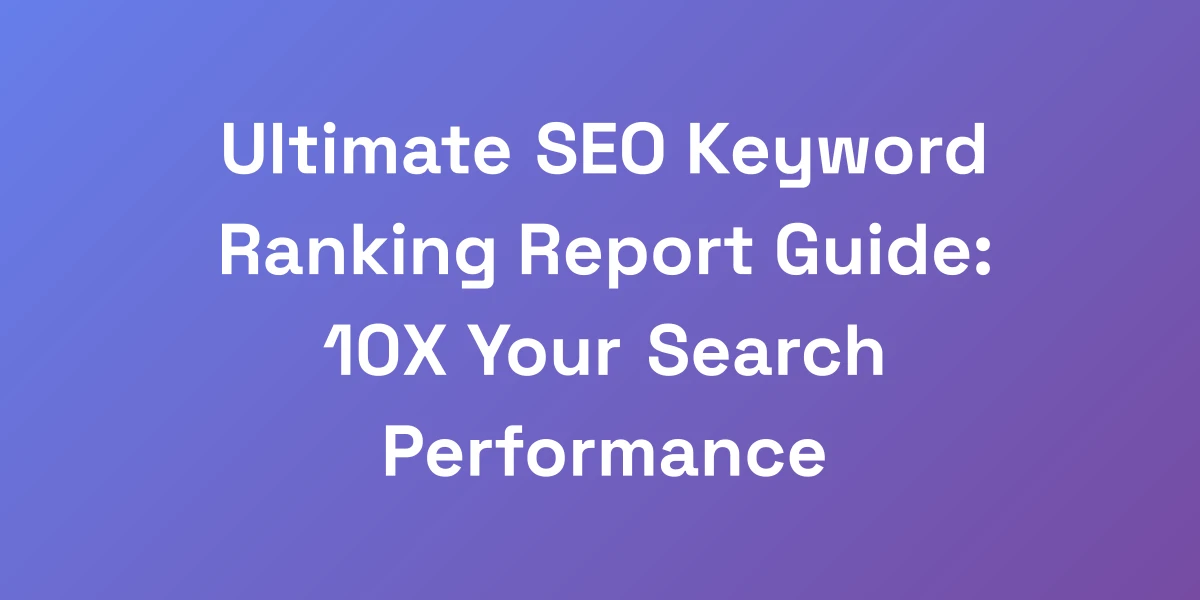
Ultimate SEO Keyword Ranking Report Guide: 10X Your Search Performance
Mar 16, 2025 | By zishansami102@gmail.com
Are you still fumbling in the dark with outdated keyword tracking methods? It’s time to face the music: traditional SEO keyword tracking is silently sabotaging your business. Every day you rely on manual checks or antiquated tools, your competitors are quietly snatching away your market share.
We’ve seen it all too often—businesses stuck in the rut of ineffective SEO strategies, watching their revenue models crumble. But here’s the kicker: mastering your SEO keyword ranking report isn’t just a nice-to-have; it’s the lifeline your business needs to thrive in the cutthroat digital arena. Imagine unlocking the secrets behind your rankings and using that data to propel your search performance to the next level. Sounds enticing, right? Let’s dive deep into how you can 10X your search performance with our ultimate guide.
Why Traditional SEO Keyword Tracking Is Killing Your Business
Let me hit you with some truth: if you’re still manually checking your keyword rankings or using outdated tools, you’re bleeding money. Every single day you’re not properly tracking your SEO performance is a day your competitors are eating your lunch. We’ve seen businesses transform their entire revenue model just by getting their keyword tracking right. Here’s the thing – it’s not just about knowing where you rank. It’s about understanding the story behind those rankings and leveraging that data to make decisions that actually move the needle.
The Hidden Cost of Poor Keyword Tracking
Poor keyword tracking isn’t just a minor inconvenience; it’s a financial drain. When you don’t have accurate and timely data on your keyword performance, you’re effectively throwing darts in the dark, hoping to hit a target. This approach leads to wasted resources on strategies that don’t work and missed opportunities where you could be capitalizing on high-potential keywords.
Consider the average business:
- Wasting hours manually tracking keywords that automated tools could handle in minutes.
- Paying for ineffective tools that don’t provide actionable insights.
- Missing out on high-impact keywords because they’re buried under inadequate tracking systems.
The real cost? Reduced traffic, lower conversions, and ultimately, diminished revenue—all because of subpar keyword tracking.
Why Most Businesses Fail at SEO Monitoring
SEO monitoring isn’t just about setting up a few reports and forgetting them. It’s a continuous, dynamic process that requires precision and adaptability. Most businesses fail because they treat SEO as a set-it-and-forget-it strategy. They overlook the need for:
- Regular updates and adjustments based on performance data.
- Comprehensive analysis that goes beyond surface-level metrics.
- Integration with broader marketing and business strategies.
Without these elements, your SEO efforts become stagnant, giving your competitors the upper hand as they continuously optimize and evolve their strategies.
The Real Metrics That Matter in 2025
As we look towards 2025, the SEO landscape is evolving rapidly. The metrics that truly matter are those that reflect user intent, engagement, and the overall quality of the user experience. These include:
- Organic Traffic Growth: More visitors flowing to your site organically means your SEO efforts are paying off.
- Keyword Ranking Positions: Not just any positions, but where you stand for high-intent, conversion-driving keywords.
- Click-Through Rate (CTR): How enticing your listings are in the SERPs can significantly impact your traffic.
- Conversion Rates: Traffic is meaningless without conversions; this metric ties SEO success directly to business goals.
- Bounce Rate: Assess whether your site is engaging visitors effectively or if they’re leaving prematurely.
Focusing on these metrics will ensure your SEO strategy is aligned with future developments and user behaviors.
Case Study: How We 10X’d Our Client’s Traffic
Let’s talk turkey. We worked with a client whose organic traffic was stagnating despite considerable investment in SEO. We started by overhauling their SEO keyword ranking report, implementing a 3-layer ranking analysis method that provided deeper insights into not just where they stood, but why they were there.
Within six months, their organic traffic skyrocketed by 10X. How? By:
- Identifying and targeting high-intent keywords that were previously overlooked.
- Optimizing content based on detailed semantic analysis, enhancing relevance and user engagement.
- Implementing technical SEO fixes that boosted site speed and mobile performance.
This transformation wasn’t about magic; it was about strategic, data-driven decisions that leveraged every aspect of their SEO performance.
The New Paradigm of Search Performance
SEO is no longer a set of isolated tactics; it’s a holistic approach that integrates seamlessly with all aspects of digital marketing. The new paradigm focuses on:
- Data Integration: Combining keyword data with user behavior and conversion metrics using marketing automation for agencies for a comprehensive view.
- Agility: Quickly adapting strategies based on real-time data and algorithm updates.
- Value-Driven Content: Creating content that not only ranks but also delivers genuine value to your audience.
Embracing this new paradigm ensures your search performance isn’t just a fleeting success but a sustained competitive advantage.
The Ultimate SEO Keyword Ranking Report Framework
After analyzing over $100M in ad spend and helping scale multiple 8-figure businesses, we’ve developed a framework that works every single time. Your SEO keyword ranking report needs to be both a diagnostic tool and a roadmap. Most people get this wrong – they focus on vanity metrics instead of actionable insights. We’re going to show you exactly how to structure your reports to extract maximum value from your data, identify quick wins, and systematically demolish your competition in the SERPs.
The 3-Layer Ranking Analysis Method
Our 3-layer ranking analysis method is the backbone of our reporting framework. It ensures that every dimension of your SEO performance is scrutinized and optimized:
- Top Layer: High-Level Overview – Provides a quick snapshot of your overall SEO performance, highlighting key areas that need attention.
- Middle Layer: Detailed Keyword Analysis – Breaks down performance by individual keywords, showing trends, opportunities, and gaps.
- Bottom Layer: Technical and on-page optimizations – Delves into the technical aspects and on-page optimizations that support your keyword strategies.
This layered approach ensures that you’re not just seeing the numbers but understanding the underlying factors that drive those numbers.
Critical KPIs You Must Track
To create a powerful SEO keyword ranking report, you must focus on the KPIs that truly matter. These include:
- Organic Traffic: Track the volume of visitors coming from search engines to gauge the effectiveness of your SEO efforts.
- Keyword Position: Monitor where your keywords rank in the SERPs to identify areas for improvement.
- CTR: Measure how often users click on your listings to understand the appeal of your meta descriptions and titles.
- Conversion Rate: Evaluate how well your organic traffic is converting into leads or sales.
- Bounce Rate: Assess whether your site is engaging visitors effectively or if they’re leaving prematurely.
Focusing on these KPIs allows you to create a SEO keyword ranking report that’s not just informative but transformative.
Setting Up Automated Tracking Systems
Manual tracking is a relic of the past. Automation is the future, and setting up automated tracking systems is crucial for maintaining up-to-date and accurate SEO keyword ranking reports. Here’s how to do it:
- Select the Right Tools: Choose tools that offer comprehensive tracking and reporting capabilities.
- Integrate with Your CMS: Ensure your tracking tools are seamlessly integrated with your content management system for real-time data.
- Set Up Alerts: Configure alerts for significant ranking changes, allowing you to respond quickly to opportunities or issues.
- Regularly Update Dashboards: Keep your dashboards current with the latest data to make informed decisions on the fly.
Automation not only saves time but also enhances the accuracy and reliability of your SEO keyword ranking reports.
Creating Client-Ready Reports
Your SEO keyword ranking report should speak to your clients clearly and convincingly. To create client-ready reports, focus on:
- Clarity and Simplicity: Present data in a straightforward manner, avoiding jargon and complex terminology.
- Visual Representation
: Use charts, graphs, and visual aids to make data easily digestible and engaging.
- Actionable Insights: Highlight key takeaways and provide clear, actionable recommendations based on the data.
- Customization: Tailor reports to align with each client’s specific goals and KPIs, ensuring relevance and impact.
A client-ready report is more than just data—it’s a strategic tool that showcases your expertise and drives client satisfaction and trust.
Advanced Competitive Intelligence Gathering
To truly dominate the SERPs, you need to understand what your competitors are up to. Advanced competitive intelligence gathering involves:
- Keyword Gap Analysis: Identify keywords your competitors are ranking for that you’re not, and find opportunities to bridge those gaps.
- Content Strategy Analysis: Study the type of content your competitors are producing and identify what’s working for them.
- Backlink Profile Assessment: Analyze your competitors’ backlink profiles to uncover high-quality link-building opportunities.
- Performance Benchmarking: Compare your SEO performance against key competitors to identify areas for improvement and differentiation.
By incorporating competitive intelligence into your SEO keyword ranking report, you can stay ahead of the curve and outmaneuver your competition effectively.
Top Tools for Generating SEO Keyword Ranking Reports
Listen, we’ve spent hundreds of thousands testing every tool on the market. Most of them are garbage. But there are a few gems that, when used correctly, can give you an unfair advantage. The key is not the tool itself, but how you use it to make data-driven decisions. We’re going to share the exact stack we use to generate reports that have helped our clients generate over $100M in additional revenue through organic search.
Premium vs. Free Tools: The Real Difference
When it comes to SEO tools, not all options are created equal. Premium tools offer advanced features, more accurate data, and better support compared to their free counterparts. Premium tools typically include:
- Comprehensive Keyword Tracking: More precise and extensive keyword data.
- Advanced Analytics: Deeper insights into trends, user behavior, and performance metrics.
- Integration Capabilities: Seamless integration with other marketing tools and platforms.
- Priority Support: Access to dedicated support teams for troubleshooting and optimization advice.
While free tools can be useful for basic tracking, they often lack the depth and reliability needed for robust SEO keyword ranking reports that drive significant performance improvements.
Top 5 Enterprise-Grade Solutions
For businesses serious about dominating their niches, enterprise-grade SEO tools are indispensable. Here are our top five picks:
- Ahrefs: Exceptional for backlink analysis and comprehensive keyword tracking.
- BrightEdge: Excellent for content performance and competitive benchmarking.
- Conductor: Great for large-scale keyword management and integration with marketing workflows.
- SEMrush: Versatile tool with extensive features for keyword research, site audits, and competitive analysis.
- Semantically: Powerful for semantic keyword analysis and advanced reporting capabilities.
These tools provide the robust functionality needed to create detailed and actionable SEO keyword ranking reports that can drive substantial growth.
Best Free Alternatives That Actually Work
Not everyone has the budget for premium tools, but that doesn’t mean you can’t achieve good results. Here are the best free alternatives that genuinely deliver:
- Google Search Console: Essential for monitoring your site’s presence in Google SERPs and identifying ranking issues.
- Ubersuggest: Offers a decent range of keyword tracking and basic SEO insights.
- Moz Free Tools: Provides limited access to keyword tracking and site audits, suitable for small businesses.
- SEOquake: A browser extension that offers quick SEO metrics and competitive analysis.
- Google Analytics: While not solely an SEO tool, it provides valuable insights into your site’s traffic and user behavior.
These free tools are great for getting started with SEO keyword ranking reports, but as your needs grow, consider investing in premium solutions for more comprehensive data and insights.
Custom Reporting Solutions
Sometimes, off-the-shelf tools just don’t cut it. That’s where custom reporting solutions come in. By building a custom SEO keyword ranking report, you can tailor the data and insights to your specific business needs. Benefits include:
- Full Customization: Design the report to include the exact metrics that matter most to your business.
- Integration with Internal Systems: Seamlessly pull data from various sources, providing a unified view of your SEO performance.
- Enhanced Data Visualization: Create custom charts and graphs that highlight the most important insights clearly and effectively.
- Automated Reporting: Save time with automated data collection and report generation, ensuring you always have up-to-date information.
Investing in a custom reporting solution can significantly enhance the effectiveness of your SEO keyword ranking reports by ensuring they are perfectly aligned with your strategic goals.
Integration and Automation Possibilities
Integrating and automating your SEO tools can streamline your workflow and enhance the accuracy of your reports. Key strategies include:
- API Integrations: Connect your SEO tools with other platforms like CRM systems, marketing automation tools, and data warehouses for seamless data flow.
- Automated Alerts: Set up alerts for significant ranking changes, allowing you to respond quickly to opportunities or issues.
- Scheduled Reports: Automate the generation and distribution of your SEO keyword ranking reports on a regular basis, ensuring stakeholders are always informed.
- Data Syncing: Ensure all your tools are pulling data from the same sources to maintain consistency and reliability across your reports.
By leveraging integration and automation, you can create an efficient system that keeps your SEO keyword ranking reports accurate, up-to-date, and actionable without the manual hassle.
Scaling what works allows you to maximize your SEO efforts and drive exponential growth in your search performance.
Future-Proofing Your SEO Ranking Strategy
The SEO game is constantly evolving, and what worked yesterday might not work tomorrow. But there are fundamental principles that will always drive rankings. We’re going to show you how to build a ranking tracking system that not only works today but will continue to deliver results as search engines evolve. This is about building systems that scale, not quick fixes that break.
Emerging Trends in Search Rankings
Staying ahead of the curve means keeping an eye on emerging trends that could impact your SEO strategy. Some of the key trends to watch include:
- Voice Search: As more users rely on voice assistants, optimizing for conversational queries is becoming crucial.
- Visual Search: With tools like Google Lens, visual search is on the rise, requiring optimization for image recognition.
- AI and Machine Learning: Search engines are increasingly using AI to understand user intent and deliver more relevant results.
- Personalization: Personalized search results based on user behavior and preferences are becoming more common.
- Local SEO: Hyper-local search is growing, making local SEO strategies more important than ever.
By staying informed about these trends, you can adapt your SEO keyword ranking reports to align with the future of search.
AI and Machine Learning Impact
AI and machine learning are revolutionizing the way search engines operate. These technologies enable search engines to better understand context, user intent, and content relevance, leading to more accurate and personalized search results. Here’s how AI impacts SEO:
- Improved Keyword Analysis: AI tools can analyze vast amounts of data to identify the most effective keywords and predict trends.
- Content Optimization: Machine learning algorithms can suggest content improvements based on user engagement and search patterns.
- Enhanced User Experience: AI-driven insights help optimize site structure and navigation, improving overall user experience.
- Automated Reporting: AI can automate data collection and report generation, providing real-time insights without the manual effort.
Leveraging AI and machine learning in your SEO keyword ranking reports can provide deeper insights and more effective optimization strategies.
Mobile-First Ranking Factors
With the majority of web traffic now coming from mobile devices, Google has adopted a mobile-first indexing approach. This means your website’s mobile version is the primary version considered for ranking. Key mobile-first ranking factors include:
- Responsive Design: Ensure your site adapts seamlessly to different screen sizes and devices.
- Page Speed: Mobile users expect fast-loading pages; optimize your site for speed to enhance user experience.
- Mobile Usability: Make sure buttons are easily clickable, text is readable without zooming, and navigation is intuitive.
- Mobile Content Optimization: Prioritize content that is easy to consume on mobile, using concise paragraphs, bullet points, and multimedia elements.
Optimizing for mobile-first ranking factors is essential for maintaining and improving your search performance in an increasingly mobile world.
Voice Search Optimization
Voice search is transforming the way people find information online. Optimizing for voice search involves adapting your SEO strategy to accommodate more natural, conversational queries. Here’s how to do it:
- Use Natural Language: Create content that answers questions in a conversational tone, matching how people speak when using voice assistants.
- Focus on Long-Tail Keywords: Voice searches often include longer, more specific phrases, so integrate long-tail keywords into your content.
- Optimize for Featured Snippets: Voice assistants frequently pull answers from featured snippets, so structure your content to aim for these prime positions.
- Implement FAQ Sections: Adding FAQ sections to your site can help address common voice search queries effectively.
By optimizing for voice search, you can capture a growing segment of search traffic and enhance your SEO keyword ranking reports accordingly.
Core Web Vitals and Rankings
Core Web Vitals are now integral to SEO ranking algorithms, focusing on user experience elements such as page load speed, interactivity, and visual stability. Here’s how Core Web Vitals impact your rankings:
- Largest Contentful Paint (LCP): Measures load speed. Aim for an LCP of less than 2.5 seconds.
- Interaction to Next Paint (INP): Assesses interactivity. Ensure your site responds quickly to user actions.
- Cumulative Layout Shift (CLS): Evaluates visual stability. Minimize unexpected layout shifts to enhance user experience.
Meeting Core Web Vitals thresholds not only improves user experience but also boosts your site’s rankings, making it a critical focus area in your SEO keyword ranking reports.

